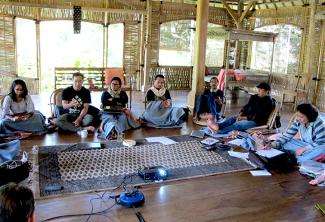On the 13th of June 2015 Samdhana Institute was chosen from eight other candidate applicants as the National Executing Agency (NEA) by the National Steering Committee (NSC) of the Indonesia Forest Investment Program's (FIP), Dedicated Grant Mechanism (DGMI) for indigenous peoples and local communities. This DGMI is parallel but independent of FIP set up for at least 5-years with total funding of 6.5 million dollars, dedicated to building the capacity of traditional local communities to sustainably manage Indonesia's forest, in collaboration with FIP's program holder, the Ministry of Environment and Forestry (KLHK) and related agencies, and reach out and obtain Masyarakat Adat's legal rights to own native lands and natural resources in partnership with KLHK.
The FSC of the DGMI Project has given this opportunity to Samdhana Institute to strengthen program management, delivery and compliance procedures and has encouraged Samdhana to secure rights of local and indigenous peoples, and maintain gender equity during and post program implementation.
DGMI integrates its standard ‘results-oriented' project framework into Samdhana's ‘direct-response' systems of grant making. This required mutual systems adjustments to guarantee mutual satisfaction, and secure funds to increase organizational capability of local people's institutions, entrusted to shepherd the process to legalize local and indigenous peoples rights. This also requires that government and NGOs participating in the project undergo continuing behavioral and attitudinal change as key actors in the process of ensuring that rights of local and indigenous people are fulfilled.
Consistent with the advances in rights safeguards mechanisms of the FIP, the DGMI also encourages Samdhana to pay increased attention to the social and environmental impact of projects being carried out at the village level.
At this moment, the DGMI project, still in the Preparatory Phase, is under going a project timeframe extension: It was originally planned 6 months (July - December 2015) has been extended to eighteen months (July 2015 - December 2016). This extension is due to the government's need, as represented by the Ministry of Environment and Forestry, for more time to issue the “no-objection letter†(NOL) regarding the appointment of Sam- dhana as the NEA. Samdhana, with support from the Ford Foundation, has already supported the implementation of two NSC meetings during the rst six months of the Preparatory Phase.
The NSC is composed of representatives of women, local and indigenous peoples Masyarakat Hukum Adat of Indonesia. They have been select- ed from a year-long consultative process conducted by Indonesia's National Forestry Council (DKN). Preparatory meetings were held in August and October of 2015 to reaf rm eight priority areas within the program previously agreed during NSC consultative meetings, ie: 1) Establish the certainty of territories owned by traditional and local com- munities; 2) Revitalize the region (especially those belonging to Masyarakat Adat); 3) Facilitate economic and institutional development; 4) Strengthen local food sources towards food sovereignty; 5) Establish disclosure of information and free to it for the traditional community, both men and women; 6) Develop renewable energy; 7) Improve access to water; 8) Establish other speci c issues within regions with special autonomy.
At both of the abovementioned meetings Project Design Data was well presented extracting main components of the program to include:
- Promoting the acknowledgement of traditional community rights concerning land and natural resources.
- Encouraging manifestation of the rights of the traditional community and the rights of local people to their land and natural resources, and supporting efforts to institutionalize these rights at a local level within the regency, province and national government.
- Laying foundations for economic development and planning ongoing development with traditional and local communities, in line with efforts to reduce carbon emissions and establish sustainable management of land and forest.
- Offering opportunities to facilitate the process of studying, providing ongoing efforts to strengthen the traditional and local communities in their ability to manage their natural resources, carry out projects and take a role in national and international initiatives.
In the second six month Preparatory Phase, Samdhana will continue to support the NSC and complete their Project Operation Manual (POM), as well as the framework of the project that includes management of social, environmental and gender factors, that altogether comprise the required input for the World Bank's preparation of their Project Appraisal Document (PAD).
NSC and the World Bank's Task Team Leader are determined to gain the approval of the World Bank Management's PAD by the end of the first semester of 2016, so that the Implementation Phase can be started by January, 2017.
See more at The Samdhana Institute Annual Report 2015




